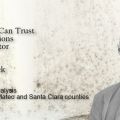Mold Testing, Inspection, And Analysis in San Francisco

Why is mold testing important for your health?
We spend most of our time indoors, which is why it is important for the air in our homes to be as mold-free as possible. The quality of the air that you breathe can impact your health. If the air quality in your home is poor, it can cause you and your family various health problems, especially for individuals with compromised immune systems or respiratory issues.
Mold can grow on almost any surface that has been exposed to moisture. Mold can grow in any area of your home, but is commonly found growing in bathrooms, kitchens, around windows, and in basement spaces. Mold can create a musty odor in the air, and people often state that they can smell something “dirty” or “earthy” in their homes. Once homeowners and renters notice this smell, they often call a Mold Inspection Company to perform a professional inspection.
Appointment
If you believe that mold is growing in your home, a professional mold inspection can assist in both confirming whether mold growth is present, and identifying the sources of the mold growth. A Certified Mold Inspector is trained to both identify mold growth, and determine the reasons that mold growth is taking place.
Mold testing, inspecting, and analysis
A mold has two components. The inspector will perform an inspection of your home to determine if any “conditions which are conducive to mold growth” are present. The inspector will then collect air samples or direct samples that can be analyzed at an independent laboratory. Standard home inspections can generally be completed in about an hour. Lab analysis of any samples collected generally takes two business days.
Visual mold inspection
The Certified Mold Inspector will begin the inspection by interviewing the client to identify any problem areas, and to gather any information about the history of the home or apartment. The inspector will inspect any areas with past or current water intrusions, particularly in bathrooms and around windows. These areas will be checked for active moisture using advanced moisture meters, thermal imagers, and humidity sensors.
Mold samples
Most inspections will involve the collection of an interior air sample to determine the level of mold spores in the air that the occupants are breathing. Inspectors may also recommend the collection of swab samples, tape samples, or direct samples. Each inspection is unique, and the inspector can advise clients on which samples should be collected.
Lab testing
All samples collected are brought directly to an independent laboratory for analysis. The lab will issue a full lab report that describes their findings and conclusions. The mold inspector can help to interpret the lab results for the client.
Interpretation of result
Once the lab report and inspection report are provided to the client, the inspector is available to answer questions from the client. The inspection report will include recommendations for both remediating any mold growth found, and addressing the “conditions which are conducive to mold growth” which were found in the home.
Related items:
 2/4/2025
Understanding Mold Test Results and Choosing the Best Mold Services in San Francisco
2/4/2025
Understanding Mold Test Results and Choosing the Best Mold Services in San Francisco